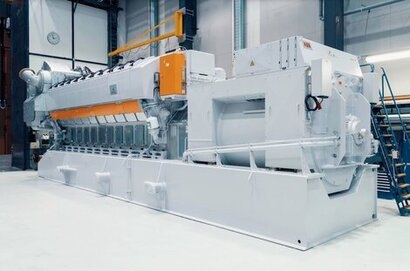
Green hydrogen is forecast to deliver 13 percent of global energy demand by 2070 , but at present there are no commercially available engines which can effectively use the fuel, potentially jeopardising global net zero ambitions.
Wärtsilä is now pioneering a milestone testing programme for its balancing gas engines to be converted to use pure hydrogen as fuel. The project in Vaasa, Finland, will assess Wärtsilä’s existing 31 gas engine technology to find the optimum parameters for running on hydrogen. Wärtsilä’s gas engines are currently used for flexible balancing power generation for power systems with high levels of renewables.
Green hydrogen, developed from renewable energy using electrolysis, and green hydrogen-based fuels will provide long duration energy storage to work alongside renewable generation and short-duration storage (such as lithium-ion batteries) to create reliable and fully decarbonised energy systems.
According to Wärtsilä’s energy system modelling, over 11,000 GW of wind and solar power is required in the G20 alone in order to create 100 percent renewable energy systems. It will require 933 GW of carbon neutral thermal balancing capacity to enable the addition of this amount of renewable energy and stabilise these future power systems.
The ability to modify existing engines to utilise hydrogen and hydrogen-based fuels when they become widely available is crucial to achieving global decarbonisation goals. The internal combustion engine is a key technology in enabling the growth of renewables today, providing the flexibility required to support the intermittent generation of wind and solar. Many countries are investing in new, highly efficient engines to support the sustainable acceleration of renewable energy. Being able to modify the engines in the future to utilise carbon neutral fuels, such as green hydrogen and green hydrogen-based fuels, means that utilities can invest confidently now to enable the 100 percent renewable system required by the middle of this century, without risking stranded assets.
“This is a milestone moment in the worldwide energy transition” said Håkan Agnevall, CEO Wärtsilä. “Global societies will have to invest billions into the infrastructure needed to develop green hydrogen, but that investment is reliant upon having market-ready engines which can run on the fuel once it is readily available. Our modelling shows that a significant amount of thermal balancing is required by the middle of this century to achieve the transition to 100 percent renewable energy. By developing engines today which can run on hydrogen tomorrow, we are future-proofing energy systems to become 100 percent renewable by 2050.”
Wärtsilä’s grid balancing portfolio, consisting of power plants, energy storage and energy management systems, effectively manages high shares of renewables and creates the conditions to produce carbon-neutral future fuels which can decarbonise energy intensive sectors, from power to mobility.
The company specialises in the deployment of thermal balancing and energy storage technology, delivering the essential flexibility required to rapidly accelerate the global shift to 100 percent renewable energy systems. It has installed a total of 74 GW of power plant capacity in 180 countries around the world, including a growing percentage of thermal balancing and more than 80 energy storage systems. Wärtsilä’s engines are capable of ramping up to full load in two minutes and can currently run on natural gas, biogas, synthetic methane or hydrogen blends, with a blending possibility of up to 25 percent hydrogen already proven today.
In parallel, Wärtsilä is running engine testing for ammonia and methanol, two alternative future fuels which will support the decarbonisation of the shipping sector and help the International Maritime Organisation to achieve its target to cut the sector’s GHG emissions by 50 percent by 2050.
For additional information:

